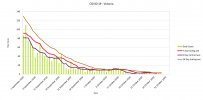Oliver Moody
London Times
October 29, 2020
(paywalled)
The pandemic is approaching a “critical juncture” in Sweden after the number of daily cases rose by 70 per cent in a week, according to the country’s chief epidemiologist.
Anders Tegnell, the public face of Sweden’s official coronavirus response, said that it would be futile and immoral for a state to deliberately pursue herd immunity, where a large enough number of the population has been infected that the disease struggles to spread.
“There has up to now been no infectious disease whose transmission was fully halted by herd immunity without a vaccine,” Dr Tegnell told Die Zeit, a German newspaper.
Sweden’s infection rate has climbed precipitously over the past two months, rising about eightfold since the start of the autumn. It is increasing in 17 of Sweden’s 21 regions.
On Tuesday Scania county, which includes the southern city of Malmo, announced a voluntary lockdown, with residents urged to avoid shops, gyms, libraries, swimming pools, meetings, public transport and physical contact with people from outside their household.
“We need to press the emergency brake to stop this development now,” Eva Melander, the region’s medical director for infectious diseases, said.
Overall nearly 4 per cent of coronavirus tests yield a positive result, up from 1.2 per cent in early September.
“It’s one of the largest increases we have seen,” Dr Tegnell said. “Partly this is the result of more intensive tracing and testing, but we definitely also have a greater spread of infection.”
Hospitals appear to be coping well in most parts of the country and the public health agency is recording an average of only five deaths a week.
Infection rates in care homes, which accounted for half of deaths in the spring and summer, remain low.
“We do have more new infections than we did in the summer and we’re taking it very seriously,” Dr Tegnell said.
“But the curve is rising less steeply than elsewhere. So far the increase has not resulted in more people needing to be admitted to hospitals. All in all, we’re fairly satisfied.”
During the first wave of the pandemic Sweden was the only western European country not to impose a mandatory lockdown. The strategy was heavily criticised by some epidemiologists after the death toll passed 5900 in a population of 10.2 million, becoming the worst in Scandinavia and, pro rata, one of the highest in Europe.
However, Dr Tegnell said forced lockdowns “tied up enormous resources” and it was better to win the public’s acceptance for looser but more sustainable guidelines.
“Swedes have changed their behaviour more markedly than almost any other Europeans,” he said. “We are travelling less than [people in] neighbouring countries. During the spring roughly 40 per cent of employees worked from home.”



